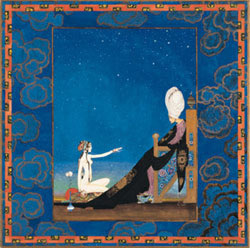 Espero entre indignada y divertida el próximo 8 de marzo, Día Internacional de la Mujer… El anterior me deparó una pasmosa sorpresa. Sobre mi escritorio había una enorme rosa de pétalos amarillos y bordes rojos y una tarjeta dirigida a las mujeres del siglo XXI, en su día.
Espero entre indignada y divertida el próximo 8 de marzo, Día Internacional de la Mujer… El anterior me deparó una pasmosa sorpresa. Sobre mi escritorio había una enorme rosa de pétalos amarillos y bordes rojos y una tarjeta dirigida a las mujeres del siglo XXI, en su día.
“Las mujeres han seducido a los literatos, han vuelto frescos a los piadosos, han empobrecido a los ricos…” “… para ellas se construyen los palacios, se tienden las cortinas, se compran los esclavos y corren las lágrimas…” “para ellas son el almizcle, las joyas y el ámbar, por su causa se reúnen los ejércitos, se construyen los cuarteles, se almacenan las provisiones y se cortan los cuellos…”
El texto es una cita de “Las Mil y Una Noches”, la célebre compilación de cuentos árabes del siglo XI. Y el remitente del supuesto elogio al eterno femenino, Random House Mondadori.
¿Por qué escogieron este texto los encargados de relaciones públicas de Random House Mondadori? Apuesto que les pareció un conjunto de alabanzas y zalamerías exóticas, impactantes y perfumadas.
Pero, ¿cuál es la imagen femenina que describen estas citas? Una creada en el medioevo por el mundo masculino. La mujer era capaz de enloquecer o arruinar al hombre, de hacerlo embarcar en las empresas más locas, audaces y crueles, un ser por el que valía la pena saquear, esclavizar, matar…
Ese ser, casi mítico, funcionaba como justificación literaria y poética de las reglas de juego que regían el mundo masculino de entonces: el dominio a toda costa y la acumulación de territorios y riqueza.
Las mujeres reales de esa época, a las que se dirigían esos dudosos elogios, permanecían, por ejemplo, esclavizadas en un harén.
“Las Mil y Una Noches” es un relato que da a pie a otro: El sultán Shahriar asesina a su esposa cuando descubre que le es infiel y, a partir de entonces, ordena que se le presente cada día una nueva mujer, que pasa con él la noche y al amanecer es ejecutada.
Una locura cruel. Pero con nuestros ojos del siglo XXI podemos verla como lago más: una perfecta muestra de violencia sexista, perpetrada con total alarde de poderío.
Entonces, la joven Sherezade rompe ese círculo de muerte: urde el plan de fascinar al sultán con el relato de un cuento y dejarlo inconcluso justo al amanecer, con la promesa de terminarlo a la noche siguiente. Así logra sobrevivir mil noches y, al final, consigue que el castigo le sea perdonado a ella y a todas las que la hubieran seguido.
Sherezade es un símbolo, como lo es el sultán. Hoy, la elección de la cita elegida por el gigante editorial también tiene significado simbólico.
Random House Mondadori Sociedad Anónima es, según su propia definición, uno de los líderes en edición y distribución de contenidos escritos en lengua española.
Es un emprendimiento de riesgo compartido entre Random House, división editorial de Bertelsmann AG, la mayor empresa internacional de comunicación, comercio electrónico y contenidos interactivos, y Mondadori, editorial que posee un tercio del negocio de libros y revistas en Italia, una de las propiedades del primer ministro italiano Silvio Berlusconi.
Random House es el mayor grupo editorial del mundo.
Desde 2001 forman parte de Random House Mondadori todos estos sellos:
Areté, Beascoa, Caballo de Troya, Debate, DeBolsillo, Collins, Electa, Grijalbo, Lumen, Mondadori, Montena, Plaza & Janés, Rosa dels Vents, Sudamericana.
Distribuye y exporta sus títulos a más de 45 países de América Latina, Asia, Europa y Estados Unidos.
Bertelsmann AG opera en 63 países y da empleo a más de 100.000 personas. Posee empresas de radiodifusión, editoras de revistas y de libros, sellos discográficos, el mayor grupo de distribución de libros y de música, logística, diseño y contenidos multimedia, entre otros negocios.
Literalmente, grupos como Bertelsmann AG tienen el poder de imponer ideas, modelos, contenidos. Decenas de miles de periodistas, escritores y comunicadores trabajan para estas empresas.
Pero su influencia va mucho más allá, porque crean y sostienen cultura y formas de ver, que se reproducen fácilmente en cada sala de redacción, por pequeña que sea. Y en cada calle. Son un posmoderno sultán Shahriar.
¿Qué es lo mínimo que la sociedad de hoy debería exigir a medios tan poderosos? Por lo menos que los contenidos con los que dejan semejante huella cultural sean un reflejo de este mundo, el del siglo XXI, y no uno del siglo XI.
Claro, este mundo no es precisamente un mar de rosas.
Las mujeres siguen siendo objeto de violencia y atropellos, aunque ya quede mal decir que todo se hace en nombre de su belleza. Y la presencia femenina sigue siendo poca y distorsionada en los medios de comunicación.
El 10 de noviembre del año pasado, el Proyecto de Monitoreo Global de Medios llevó a cabo su cuarta investigación para evaluar “cómo ha ido cambiando la representación de género en los medios de comunicación” de distintas regiones del mundo. Los resultados estarán listos a tiempo para la conferencia que las Naciones Unidas celebrarán en marzo, en Nueva York, con motivo de los 15 años de la Cumbre de Beijing.
Algunos resultados del estudio anterior, de 2005, indican que las mujeres eran apenas 21 por ciento de los actores de las noticias (y los hombres el restante 79 por ciento), 17 por ciento de las fuentes expertas y 14 por ciento de las portavoces, pero duplicaban a los hombres entre las fuentes que eran víctimas.
En fin, no necesitamos más sultanes, ni tampoco queremos más Sherezades. Necesitamos estar alerta.
]]>“Invitation for a consultancy in conducting a training on enhancing facilitation skills of development practitioners [...]]]>

A collective indigestion of jargon. Photo by Beralpo, Wikimedia Commons
My friend is looking for a job. He finds an ad of the US-based Mercy Corps and calls me for a translation. The ad is in English – sort of – but he can’t figure out what it is about:
“Invitation for a consultancy in conducting a training on enhancing facilitation skills of development practitioners of livelihood enhancement programs.”
What does this text mean exactly, except that we have a collective indigestion of development jargon from NGOs and the UN, from academics and politicians, and that the media is complicit in this masquerading of long words as substance?
Here are some egregious examples from media houses I write for outside Gender Masala (thus, I will not bite the hands that put food and wine on my table by doing a name-and-shame or I will have to apply for the Mercy Corps job myself and, for my sins, spend my days writing about mainstreaming stakeholder engagement through shared learning platforms).
“Unless the ways in which teachers promote knowledge acquisition improve on a system-wide scale, mother tongue education on its own will not make a difference.”
Promote knowledge acquisition? I think that means teaching. Yes, teaching methods must improve countrywide for mother tongue education to work.
If pedagogues speak so cryptically, no wonder teachers can’t teach well in any language.
hHere is one on gender: ”To change these already entrenched values will mean women have to consciously make a paradigm shift in the way they handle themselves.”
How about this one? “XX says that the project aims to highlight good practice in jointly identifying and addressing developmental challenges at local community level between young volunteers working in African and European organisations.”
Excuse my coughs, I have just choked on jargon.
 Photo by Bobby, Wikimedia Commons
Photo by Bobby, Wikimedia Commons
If NGOs and the UN want to (ab)use jargon in their rarified world, so be it.
But we journalists should not parrot meaningless words. We should translate jargon into real and simple language so readers can understand what it means.
* Check this useful list of 200 jargon words banned by the American Association for Local Government.
* Read here a really interesting IP S story about language and gender.
I feel neither more “good” nor more “patient”. I am a hard-headed woman, as always. Attached to life, as ever!
The day when my friend Pigi, my oncologist, told me that I had breast cancer, I cried desperately. The first thing I did was to phone my [...]]]>
I feel neither more “good” nor more “patient”. I am a hard-headed woman, as always. Attached to life, as ever!

Paola Rolletta by Luis Abelard
The day when my friend Pigi, my oncologist, told me that I had breast cancer, I cried desperately. The first thing I did was to phone my partner to tell him this piece of news, of which I had had some premonition. And I understood that premonition really exists.
Curiously, I did not wonder “Why me?” My reaction was: “This cursed disease has hit me too!”
Perhaps some survival instinct made me articulate my feelings in this way, to ease the pain in my heart.
There are more and more of us, women between 40 and 50 years of age, diagnosed with cancer, most of hormonal origin. I must read more about the disease: until now, I have not allowed myself such reading.
First I said that I couldn’t read more about cancer until I finished this calvary of chemotherapy. Now that I finished the eight sessions, I say that I will wait to read until I have the CAT (computer axial tomography) results.
In a nutshell, I don’t want to cram on cancer because I decided to trust my three doctors, the surgeon, the oncologist and the nutritionist, to save me from this darkness.
In darkness
What shocked me most is the darkness you live through while undergoing chemotherapy. It is almost like a mirror lysergic acid experience, but instead of colourful hallucinations, they are black, like anti-matter.
Maybe it is the chemicals shot into my body during six months (eight chemo sessions, 4 FEC and 4 Docetaxel, every 21 days) that makes me see the world, inside and outside, so dark.
The darkness weighs more heavily than the hair loss, the nausea and the vomiting. This metaphysical darkness that totally grabs you is devastating: no words, gestures, musical notes or flowers. For a long time, darkness dominated my thoughts and my soul – an unnatural darkness that does not spring from disease-associated pessimism.
To find strength, I tell myself that mine is a chemical pessimism that – I hope, I trust – will save my life.
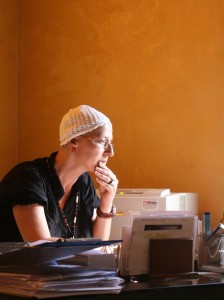
Photo: Sol de Carvalho
And I hope that radiotherapy next month will be less dark!
Feeding nitro-glycerine to my body
Earlier this year, I wanted to quit smoking and went to the naturopath for acupuncture. In her office by the sea in Maputo, Dr. Fernanda examined me and told me, without mincing words, to have a mammogram right away. Because I smoked and took birth control pills for decades, I was literally feeding a cancer with all that poison, that nitro-glycerine, she said. Just like this. Raw and cruel.
I was so frightened I took the first flight back to my home country, Italy. That saved my life! Dr. Fernanda was right, in her cruel way. Even when I did not have any symptoms, even though I had not felt any lump, she was right.
Cancer is a multi-factor disease but breast cancer is, most cases, of hormonal origin. Why these hormones go crazy and make us develop cancer it is not known yet, but that they are to blame, this is known. This knowledge is a great leap forward to cure many cancer patients and to prevent the disease.
Ten years ago I read “Illness as a Metaphor” by Susan Sontag while I was working on a documentary on AIDS in Uganda for Portuguese TV.
Ten years later, I re-read it. I tracked it down in the boxes where I stored my books when I moved to Maputo.
In the meantime, Susan Sontag died of cancer. I remember her, wearing a green dress, in a photo taken by her lover Annie Leibovitz.
Every day I repeat to myself Sontag’s call to realism: cancer can be treated with chemotherapy more efficiently than with diets or psychotherapy. Sontag unpacked beliefs that have fed the popular mythology about cancer up to these days.
Every day I repeat her words in the introduction: illness is the night-side of life, a more onerous citizenship.
The disease that has hit me contains, paradoxically, an element of reassurance: every day I must face a new day, a daily routine. Suffering serves as a mediator between my will to live and all that is threateningly unknown. But the unknown is part of life itself. It is life.
]]>A. When it is shown in a pornographic magazine, film or website.
B. Never.
C. When it is emailed to government officials urging action to improve public health.
One could argue about A and B but this blog is [...]]]>
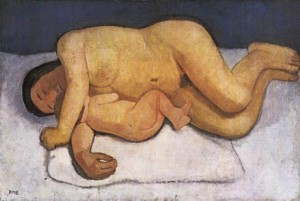
By Paula Modersohn Becker
When is a photo of a woman giving birth considered pornographic? Take your pick:
A. When it is shown in a pornographic magazine, film or website.
B. Never.
C. When it is emailed to government officials urging action to improve public health.
One could argue about A and B but this blog is about C.
Earlier this year, in Zambia, Chansa Kabwela, news editor at the feisty opposition newspaper The Post, was charged with circulating pornography with intent to corrupt public morals. What was her crime? During a nationwide strike by Zambia’s miserably paid doctors, a woman allegedly gave birth without medical assistance in a hospital car park. The baby was in a breech position and later died.
Her family sent Kabwela the photos but she found them too graphic for publication. Instead, she emailed them to the vice-president and other government officials and women’s groups, urging a negotiated end to the strike to avoid more deaths.
President Rupiyah Banda found the photos “morbid and peculiar” and Kabwela, a 29-year-old mother of two, was charged with the porn offence, which carries a five-year jail sentence. The state argued that giving birth is sacred in Zambia and the photos were disrespectful.
If giving birth is so sacred, why was the woman delivering in a car park?
Good sense prevailed and in November a judge acquitted Kabwela.
The Post has long been harassed by government for exposing corruption. This court case is one more instance, using birth, women and tradition as a cover to erode press freedom.
A very famous Christmas birth
This being the season of a famous birth, on the other side of the world, in New Zealand, a mischievous billboard about the immaculate conception has angered Catholics. 
It shows Joseph and Mary in bed. She looks blissful; he looks dejected. The kicker: “Poor Joseph. God is a hard act to follow.”
The twist is that the originator is an Anglican archdeacon who commissioned an ad agency to produce a Christmas poster. The archdeacon argues, somewhat confusedly, that the purpose was to highlight that Christmas is about love, not about Mary’s impregnation by God.
Within hours the billboard was defaced with brown paint. Well, at least this is better than rioting over caricatures of the Prophet or charging an editor with pornography.
Giving birth is charged with cultural meaning: it can be sacred, pornographic, joyful, “eculiar” or offensive. For half a million women, every year, it is deadly.
Yet these deaths do not spark the same outrage as a billboard or photographs.
My wish this Christmas is quite simple: safe delivery for women everywhere, not in a car park and not in a manger, neither holy nor unholy, whether through sex, artificial insemination or immaculate conception. Just safe.
***
Read about why maternal mortality remains so intractable here and about midwives in India.
]]>What had tongues wagging was citizen’s journalism, dispatches by ordinary folk about electoral irregularities from the Rovuma to the Maputo rivers.
Good stuff: government cars illegally used for campaigning, [...]]]>

The sisters can do it by themselves. By A. Vilanculos
The buzz in Mozambique during the recent elections was not the TV debate among presidential candidates debate (there is none) or their programs (all vague).
What had tongues wagging was citizen’s journalism, dispatches by ordinary folk about electoral irregularities from the Rovuma to the Maputo rivers.
Good stuff: government cars illegally used for campaigning, with cellphone pics of their registration plates (until officials wised up and started covering up plates and ministry logos with party posters). Reports of youth tearing downs other party’s posters, fistfights, intimidation, and police lack of impartiality.
On election day, people told of late opening of polling booths and misbehaviour of poll officials and party observers.
Information was relayed by a network of 110 correspondents in 11provinces (most community radio reporters) and concerned citizens who texted, phoned and emailed.
The information was fact-checked and collected in a daily bulletin produced by the Centro de Integridade Publica (an NGO anti-corruption monitor).
The bulletin, in Portuguese and English, was emailed as pdf to some 3,000 subscribers, who redistributed it to at least double this number, and was widely reproduced, for free, by the local press, especially the 60+ community radio stations.
This was watchdog citizen journalism at its best.
Thanks to the Bulletin, Mozambicans had balanced coverage of the pre-poll partial exclusion of the new kid in the block, the opposition MDM, of the instances of ballot box stuffing and the invalidation of 100,000 votes.
The Bulletin provided a credible, professional and impartial source of information, above party politics (Mozambican media is aligned with political parties, ideological blocs and economic interests).
Bits of similar projecst exist elsewhere in Africa but I don’t know of any other so well-rounded.
In Kenya, during the post-electoral conflict two years ago, people texted and phoned in reports of violence to a hotline set up by an enterprising NGO. The information was quickly confirmed and uploaded onto a web map. The press, donors, and people could keep tabs on which parts of Kenya were burning.
Ghana made good use of sms by citizen correspondents during its recent elections.
Imagine if women developed such a tool.
Imagine that the 50-50 Campaign for equal political representation in Malawi could track women candidates during the campaign and the polls, and keep tabs on the insults, the stone-throwing, and the intimidation of women candidates seen last year.
In South Africa, during the 15 days against Violence against Women that started this week, a daily bulletin could keep track of gender-based abuse, collecting reports from police, rape crisis centres, and shelters. This would provide a graphic picture of South Africa’s second epidemic, after AIDS.

Grab it now! Pic b y A. Vilanculos
Historically, women are the last to use new technologies. This time, we should grab it now!
Check the Take Back the Tech site for cool ideas on taking control of digital technology to end violence against women.
And not only digital – one idea I liked is to go for a walk with a chalk and write up your thoughts on public space.
Watch the sidewalks of my neighbourhood in Pretoria – have chalk and thoughts, will walk.
* Read IPS stories on femicide in Chile, forced sterilisation in Peru and gender-based violence elsewhere.
]]>I will call her Gabra (gift, in Amharic), for our conversation was private. I met her at a monastery near Lalibela, the mystical city of [...]]]>
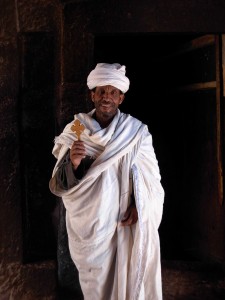
Patriarchal in all senses. By M. Sayagues
What drives a 17-year-old girl to enter a monastery? Today she is 30, and still happy about her choice. Her eyes sparkle and her laughter comes easy. She exudes peace.
I will call her Gabra (gift, in Amharic), for our conversation was private. I met her at a monastery near Lalibela, the mystical city of rock-hewn churches in northern Ethiopia.
Monastic life has a long tradition and prestige in the Ethiopian Orthodox Church. The oldest monastery dates from the 6th century. A monastic renaissance between the 13th and 16th century brought great moral and political authority to clergy.

Custodians of tradition
Gabra’s rock-hewn monastery dates from the 12th century. Her room is excavated in the pink tufa rock. Two built-in-the-rock platforms, covered with a thin mattress, do as couch and bed. An old cupboard holds a few plates and cooking utensils, three of the long green robes worn by Ethiopian peasants, the white headscarves that nuns wear, and two pairs of sandals.
For income, she and her fellow nuns weave cotton and silk into diaphanous shawls, sold at the monastery. She rises before dawn to pray – the first of daily seven prayers. Her ambition is to study theology in Addis Ababa or in Lalibela.
Gabra is not completely cut off from the world. She has a cellphone and a radio. On Sundays, relatives and friends visit.
Choices
I ask her if marriage and children ever interested her.
“It is a privilege to be single and not to have children,” she says softly, smiling but firmly. She sounds relieved.
Unmarried myself, I agree that motherhood and marriage are just one option. I understand the spiritual call, the peace of contemplation and withdrawal, of a simple lifestyle unencumbered by material things.
Yet I wonder if female genital mutilation had to do with her decision.
In Ethiopia’s eastern region, a girl might suffer genital cutting between the age of 15-17, before marriage. Her clitoris would be cut, sometimes the labia.
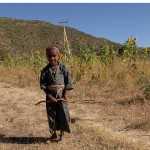
She has a right to her bodily integrity.
In Somali region, she would have infibulation at a younger age: the complete removal of her genitalia and, to preserve virginity, being stitched shut with an acacia thorn, leaving only a hole to urinate.
About three-quarters of women in Ethiopia between 15-49 have suffered some form of genital mutilation, said a government survey of 2005. The practice is fading – but too slowly, say activists.
It is not called mutilation for nothing. Sex and childbirth will be extremely painful and dangerous.
If finding a husband means suffering genital cutting, a hard mattress in a rock-hewn room is a much better place than a king-size wedding bed.
Gabra did not speak English, my male guide spoke little, and sex topics are taboo in Ethiopia, so the conversation went in another direction. Gabra was curious about my life, my work, and my daughter. 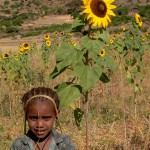
“Would you want to live like me?” she asked. “I don’t think I could,” I said. “But I feel the beauty of this simplicity.” She smiled.
Ethiopia looks and feels ancient and spiritual. Social cohesion is remarkable. But the same lifestyle that makes ferenji (foreigner, in Amharic) wax lyrical about the “biblical landscape and people” binds women to painful and dangerous traditions.
Some traditions are simply annoying. Women cannot join the rites if they are menstruating, ergo unclean. At no time of the month can women, local or foreign, enter the most sacred chapel of the Lalibela complex, Bete Mikael, where King Lalibela is buried. We are only allowed a glimpse from the door. In some monasteries, no females, including of the animal kingdom, are allowed.
Monastery visitors take leave at 5 PM (international time; in Ethiopian time, 11 in the night). I make my way down the stony path, the tufa rock glowing pink and gold in the sunset.
I am thinking that the monastery – the spiritual world – may be a blessed refuge from the hardship of being born female in a deeply patriarchal world.
Read recent IPS stories about genital cutting in Uganda, Sierra Leone and cross-border in West Africa.
]]>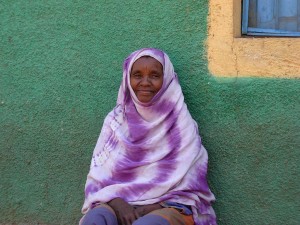
Women manage family health in Ethiopia.
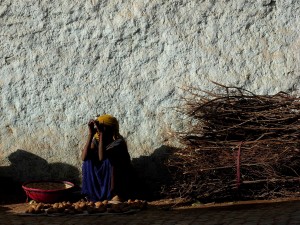
Pics by M. Sayagues
This was not an ordinary polio vaccination day for the children of Babile and Kombolcha, small towns about 500 km East of Addis Ababa. Ferenjis (foreigners in Amharic) [...]]]>
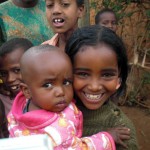
By Gifti Nadi
This was not an ordinary polio vaccination day for the children of Babile and Kombolcha, small towns about 500 km East of Addis Ababa. Ferenjis (foreigners in Amharic) had arrived!
About 100 Rotarians from the USA and Canada paid their way to Harar and Dire Dawa in Eastern Ethiopia to join local health workers in a massive drive to vaccinate 11.5 million children under five nationwide.
In recent years, 24 cases of polio have been detected in Ethiopia, likely coming from Sudan, says the World Health Organisation.
We travelled in small groups to the towns nestled against the backdrop of stunning mountains. We went door to door and were warmly welcomed by the primarily Muslim, Oromo and Somali families.
Last year, a survey showed that 70 per cent of mothers know about polio’s dreadful consequences and the benefits of vaccination, thanks to the work of dedicated community health workers.
Still, some believe that the vaccine might hurt the kids, so it was good to see the women coming forward.
Away from kitchen and kids
Note the word – women. It was 100 per cent women who brought their kids for vaccination, with the exception of one helpful young man. When a woman lied about not having any children, he convinced her to bring her kid out.
Otherwise, the men were either invisible (out in the town) or chilling out chewing chat (a mild narcotic that is legal), away from women, kitchen and kids.
Only once, in a mostly Somali village, a couple of older men came and asked us what we were doing. Just the Ferenjis in yellow shirts made them curious, I think.
Cheers for the women! They knew what the two little drops meant – a life free of polio for their children. One by one, they brought out their charming little ones while we took turns giving them the drops.
This never took place without a fight. Screams of terror and attempts to escape and spit out the drops were common, a natural reaction to being suddenly bombarded by strangers in yellow shirts.
The pictures tell all. Those under the age of 4 have a suspicious frown while their older siblings smile widely.
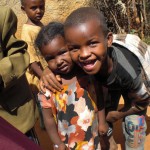
By Gifti Nadi
As we moved from home to home, the crowd grew larger. The playful kids practiced their English, held our hands and warmed our hearts. This was surely a life changing experience and a first for many on this trip.
I was blown away by the dedication and contagious spirit of mothers, community health workers and Rotarians. It was an honor to play a part in a global initiative to eradicate polio from this earth.
*The polio vaccination drive is part of a US$200 million Rotary International Campaign and matching pledges of US$355 from the Bill and Melinda Gates Foundation.
]]>A Saudi woman journalist escaped punishment last week but her cameraman wasn’t so lucky.
Rozana Al-Yami, 22, was pardoned by Saudi Arabia’s King Abdullah after the court sentenced her to 60 lashes for her work at the talk show Red Line in LBC, a Lebanese satellite TV.
[...]]]>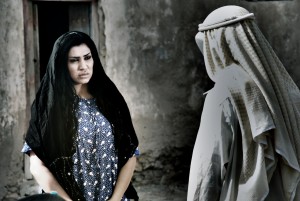
Shall we talk about it?
A Saudi woman journalist escaped punishment last week but her cameraman wasn’t so lucky.
Rozana Al-Yami, 22, was pardoned by Saudi Arabia’s King Abdullah after the court sentenced her to 60 lashes for her work at the talk show Red Line in LBC, a Lebanese satellite TV.
She made international news. He didn’t. No one mentioned that he has to serve a two-month jail term. His name remains anonymous in press reports.
Some would call this positive discrimination in favour of women but to me iit s a general bias. Women have been striving all over the world for equality, not favoritism.
Of course , Al-Yami doesn’t deserve to be punished. Neither does the cameraman nor anyone involved in the TV show that grabbed the hearts of million of Arab viewers but disturbed the conservative image of Saudi Arabia.
Let’s talk about sex
Sex remains a big taboo but the Arab world is opening up its airwaves to the topic. The LBC’s Red Line wasn’t the only TV show that tackles sex but there are few others. Be surprised: sex topics such as pleasure sex and organism that used to be discussed secretly by women during friendly gatherings are now discussed on air through many regional TV Channels.
One of the most popular talk show is Love Tales, by Dr Fawziya Duree, showing every Saturday on a private Kuwaiti Channel. Dr Duree holds a PHD in sex, culture psychology and believes in the need to discuss sex as an ordinary and important matter in life.
Her program started with a new, fresh approach to discussing marital problems and love relationships.

Sex talk: opening the door to freedom.
After gaining huge popularity, she shifted to more daring topics, such as sex during menstruation (a taboo among Muslims), passionate kissing and the anatomically correct description of genital parts.
In each show Dr Duree boldly discusses bold sex-related topic and receives calls from viewers calling for help in their sex-related conflicts. Although those programmes are opposed by hardliners, they are gaining popularity day by day.
Love Tales can be seen in Saudi Arabia. Let’s spare a compassionate thought for the poor cameraman jailed for something he could do freely in other Arab countries.
Images from the movie Anklet Dancer, Bharain 2008. Courtesy of director Ali Al ALi.
]]>http://www.campaignforrealbeauty.ca/bblank.asp?id=6895
Digital cosmetic surgery – nip-and-tuck, botox and liposuction, on the screen, with a click – render these models picture-perfect (excuse the pun) and thoroughly unreal.
There [...]]]>
http://www.campaignforrealbeauty.ca/bblank.asp?id=6895
Digital cosmetic surgery – nip-and-tuck, botox and liposuction, on the screen, with a click – render these models picture-perfect (excuse the pun) and thoroughly unreal.
There is no way a non-photoshopped woman can attain that perfection. Hey, we are human. We have flaws.
In France and the UK, women lawmakers recently proposed that ads should disclose when their photos have been digitally manipulated to a great extent. They argue that bodily digital perfection in ads undermines the body image and self-esteem of girls and women.
Anorexia, bulimia, eating disorders, obsession with thinness and unnecessary cosmetic surgery follow. Meanwhile, sales of weight-loss products and push-up bras soar.
The tricky problem for lawmakers and advertisers alike is where to draw the line between (acceptable) touching up a pimple or a wrinkle and engaging in full (unacceptable) deception.
Among the most egregious offenders: the French magazine Paris Match nipped the bulging love handles of President Nicholas Sarkozy, in evidence while he canoed bare-chested in the USA.
Oprah Winfrey always has a waist in the cover of O magazine, while flat-chested Keira Knightley miraculously acquired big boobs for her recent Chanel Mademoiselle perfume ad.
The alcoholic drink Campari must have some magical effects on bones because actress Jessica Alba got sharper collarbone and knee definition, longer arms and a tinier waist in its recent ad.
Eating disorders once afflicted mostly affluent white teen girls in the West. Now they have spread across the world, among all ages and ethnic groups and, increasingly, among young men.
It is harder to quantify how the unreal perfect bodies in ads distort the self-image of girls and boys worldwide.
Watch the video and share your thoughts about the proposed disclosure measures.
]]>